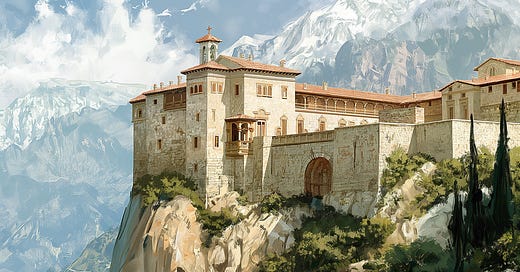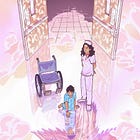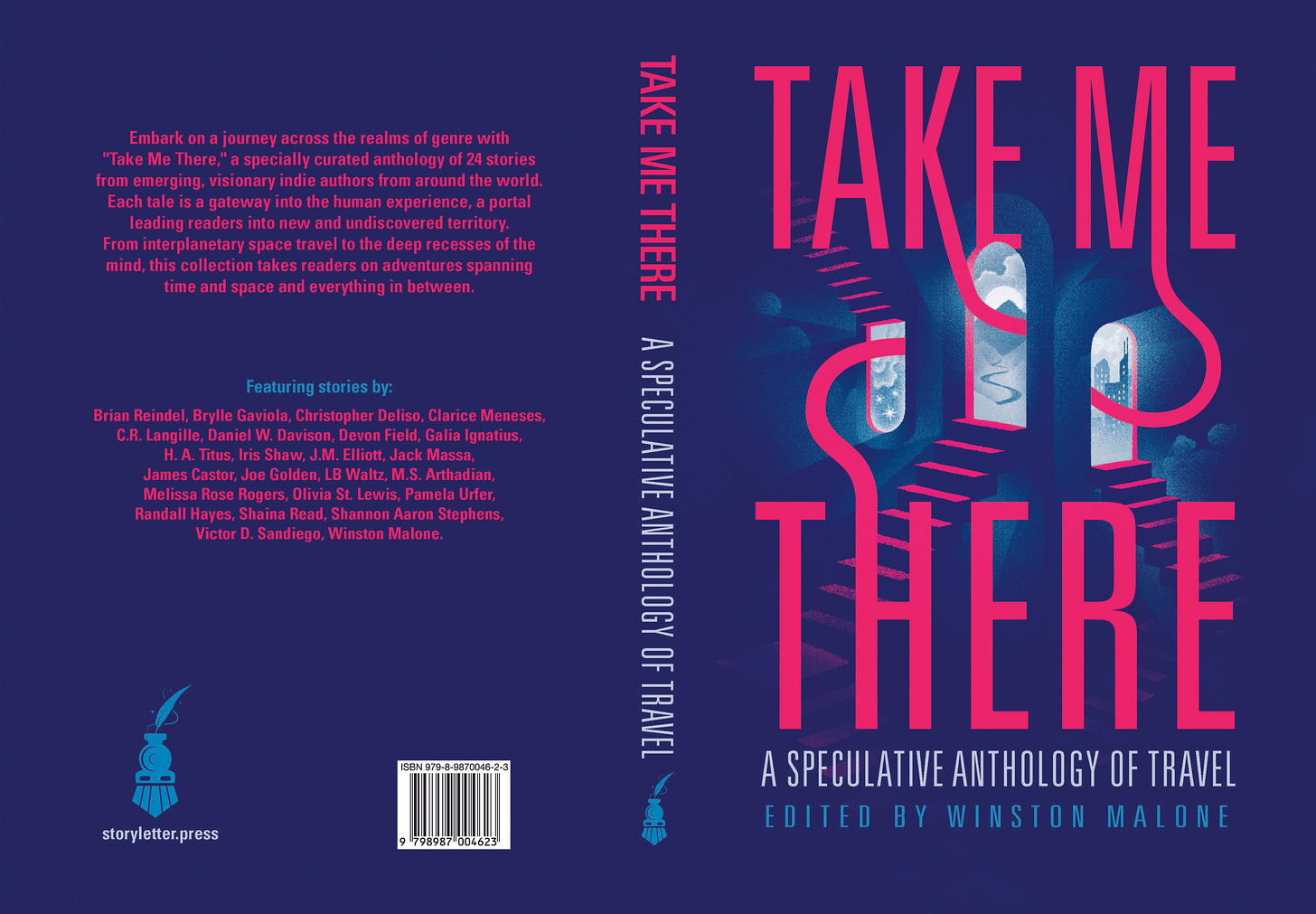Sightseeing with Galia Ignatius and Chris Deliso
Interview Series Part 7 | Getting to know the authors featured in "Take Me There"
Take Me There: A Speculative Anthology of Travel is a collection of short stories featuring characters on the move. Whether transcending to a higher plane of existence, exploring dangerous forests, or terraforming hostile planets, this collection has it all. Out now!
Learn more from the authors in our anthology in this week’s interview series!
Two Visions of the Mountain of the Saints by Chris Deliso
Two Visions of the Mountain of the Saints is an example of dream fiction; yet while it simply provides a faithful reproduction of the author's dream—ostensibly, of an actual place on earth (the monastic community of Mt. Athos in Greece), several details emerge in the vision to make this impossible, ranging from the style of architecture to the people encountered, to the improbable 'leap of faith' that finally delivers the narrator to the only named and 'real' Athonite destination, yet one to which he has never been. The added element of lucid dreaming is encountered when the narrator, at different points, reveals the need to not concentrate too hard, lest the dream be dissolved. The final result is not so much a story with any definite meaning as a sort of mental travel to a place of physical travel, while in a dream state, leaving the question of meaning (if any) up to the reader's experience.
Faran: The Launch by Galia Ignatius
Faran: The Launch is a captivating fusion of dystopian science fiction and gritty realism, plunging the reader into a clandestine world where society's discarded souls are given a second chance. As the story unfolds, a young woman and her companion are forcibly taken from their bleak existence and thrust into a high-tech rehabilitation facility. The narrative masterfully explores their journey from addiction to a semblance of recovery, only to reveal a sinister plan. This tale, rich with tension and moral dilemmas, calls back to the harrowing realities of addiction while presenting an original, thought-provoking adventure that questions the very essence of survival and humanity.
If you could go anywhere in the world, where would it be and why?
Galia: I used to want to travel to outer space, explore the cosmos, and never return. But now, after traveling the planet extensively for work and pleasure, I find that I understand and appreciate the meaning of the French saying, “Fleuris là où tu es plantée.” Bloom where you are planted.
Chris: I've always wanted to visit Brazil, for some unknown reason. I really love the combination of its diversity and great spirit and music; I would prefer swimming in the Atlantic, though, over giant insects and Amazonian perils. Though the whole idea seems impossible. Perhaps the aspect of impossibility in itself is also a strong factor in the perception of attraction; we always strive for the unattainable, after all, and dream of seeing places that are distant and somehow beyond our reach... but that is an ancient part of the human condition.
Would you travel to the setting of your story? Why or why not?
Chris: If we look at it 'literally,' and say the dream represents Mt. Athos—well, I have been there several times in the past 24 years on pilgrimage, visiting the monasteries. However, due to the above-mentioned impossible aspects of the story/dream, it is clear that the narrated location does not exist. I am somewhere between Neoplatonism and Berkelan Idealism in view, and perhaps there is some afterlife or other world in which one can access all these dreamt destinations as tangible places. But for now, I will settle for simply recounting them in my writing.
Galia: I have already been to the setting of my story, the setting at the beginning and at the end. However, I would definitely like to visit the launch site to see what's really going on there. :-)
If you had 24 hours to live in any fictional world/universe, which one would it be?
Galia: Kurt Vonnegut's “Galápagos.” I read it a long time ago, but I still think about it a lot. It's about a small group of disparate people who are shipwrecked on a fictional island in the Galápagos—surviving a global catastrophe. They proceed to adapt, breed, and evolve in isolation on this island. Vonnegut's story has it all—the supernatural, science, evolutionary concepts, life, and death. I would definitely like to take a peek for a day.
Chris: Two proposals. First, I've been doing some research into the 19th-century Irish author of ghost and Gothic horror stories/novels, Joseph Sheridan Le Fanu, and for a better understanding of his singular genius, I'd like a tour of the Dublin and Irish countryside of his day and before, as seen in works like The House by the Churchyard and his shorter stories. Especially as I've been to Ireland in the late 20th century, I might have something to compare it with—was it really as haunting and as great fodder for such stories as Le Fanu produced, or do we need to give him more credit for his incredible imagination?
The second location would be Paris in the 1920s, as described in Hemingway's memoir, A Moveable Feast. I know that this is not necessarily the most fictional universe out there, but I'd rather suspect that Hem managed to enhance the city's already great reputation with his writing style, which uses description of the smallest physical details and states of mood to create magnificent ranges of meaning that often take years to fully sink in.
If you only had eight words to describe your story, what would they be?
Chris: Ethereal, impossible, delicate, symbolic, loving, healing, faith, dream.
Galia: Despair, Hope, Fear, Bravery, Future, Past, Eternity, Family.
Describe your writing style and what readers can expect from you in the future.
Galia: Depending on the story, my style can change—my tone changes. What I have to watch out for is leaking too much emotion. :-)
Chris: The present dream-narrative is told in a fairly straightforward, albeit slightly literary way to mirror the 'airiness' of the theme/topic. This is the first style of my dream fiction; other stories (some of which I've published on Substack and elsewhere) do not do a 'straight narration' of a dream, but rather incorporate the dream or an image from one as part of a more complex plot. Therefore, the writing style can be fluid and adapted to all sorts of goals, depending on the narrator's voice, tonality, and the goals of the story.
For the future, my major current project for which I must find a publisher is my first Detective Grigoris novel, revised and completed on 8 June. This 259,000-word novel is the 'origin story' of a young Greek detective and takes place around the turn-of-the-millennium in and around Greece. It is a great action/adventure/international intrigue story set against historic and fictional events of our time, and includes strong elements of history, travelogue, philosophy, and the Byzantine Orthodox heritage, as well as contemporary events known more widely. So it is going to be a good read for both expert audiences and those just curious but who may not know of the region. It mixes high drama and action with comic gold. I think it came out alright.
How has travel informed or influenced your writing?
Chris: I've been traveling my whole life, studied abroad, and have lived in Europe for most of the last 27 years. My first travel article in a US newspaper, in the summer of 2001, was about Greece. Fast-forward many publications later, including a travelogue, and I contributed to researching and writing over 20 guidebooks for Lonely Planet between 2007-2014. I have constantly published travel articles in media around the world, and even when (as with journalism or history) the direct topic is not travel, the fact of living abroad and interacting with people from different cultures and outlooks has kept me constantly aware of the real values of difference that we usually hear of as a sort of euphemism. Finally, this international exposure has introduced me to many people, places and situations that could not be imagined unless they existed. This makes the job of the fiction writer exponentially easier.
Galia: As they say, travel is the best teacher, the best education. It opens your eyes to new ideas and perspectives, but also confirms that we all have much more in common with each other than we have differences. I love learning the superstitions, lore, and beliefs of other cultures. There is usually a common theme.
Describe your all-time favorite vacation or holiday trip. Tell us what made it so special.
Galia: Two trips stand out. One trip to Stockholm because of the luxury hotel on the water and the isolation of it—guests had to take a boat to get to the main city. The weather at the time was cold and cloudy, which I love. I often think that it would be the perfect place to write the great novel, if there was such a thing.
The other trip was to the desert in Algeria. It was definitely devoid of luxury—very rustic. We sat on old rugs placed on the sandy dunes waiting for the stars to come out, while the local guide made us tea over a fire. It was just incredible seeing so many stars without any light pollution. And so many shooting stars. The local guide noticed my awe and asked, “You have this in America?” At first, I thought to myself, “Of course we have this in America—we all live under the same sky.” But I checked myself and softly affirmed to him that we had shooting stars in America—just very difficult to see them. I later thought to myself, “Do we really live under the same sky? After all, every perspective and sighting must be unique to the viewer.” I think about that experience a lot.
What is your favorite aspect of your story? What inspired you to write it?
Chris: I can't answer the first question, as this story is simply the literal transmission of a dream I had. I do think it is at least noteworthy, however, that the only text element in the story/dream was a monastery name, in the original Greek letters. That was 'as it should be,' so I guess I must thank my subconscious for getting it right. As for inspiration, since 2021, one of my writing projects (aside from my detective novel) has been compiling this book of dreams as they happen, when I can remember them, and if they seem notable at all and not too fragmentary. I have about 30 so far and hope to publish them all as a collection someday.
Galia: I think about how absolutely brave all of us are/were to come to this Earth—to be totally helpless and dependent on the care of our fellow humans for many years. I think about each person's bravery, and I think about the absolute trust we place in others at the time of our arrival on this planet. No one's life is insignificant, and all of us are worth caring for. This human experiment is just amazing.
What would you tell your readers before being launched in an exploratory spacecraft?
Galia: Take care of each other and auf Wiedersehen.
About the Authors
Galia Ignatius has been a professional writer and ghostwriter for businesses and academia since 2005. She also writes fiction for herself and has recently ventured into sharing that writing with the public.
Christopher Deliso is an American professional writer and Oxford-trained Byzantinist, with over 25 years’ experience of research and freelance writing from Europe, publishing everything from poems and stories to journalism, analysis, over 20 travel guides for Lonely Planet, and several books on history, travel and current events. He very much hopes that his recently-completed literary detective novel, set in Greece and its near-abroad at the turn of the 21st century, will be just the first in a multi-part series. You can read Chris’ writing on his Substack at christopherdeliso.substack.com and on his official website, christopherdeliso.com.
Thanks for going on this journey with us. We hope you enjoyed this sneak peek into a couple of the stories in our brand-new anthology. Feel free to participate by answering some of the questions in the comments below!
Take Me There: A Speculative Anthology of Travel
Embark on a journey across the realms of genre with "Take Me There: A Speculative Anthology of Travel," a specially curated anthology of 24 stories from emerging, visionary indie authors from around the world. Each tale is a gateway into the human experience, a portal leading readers into new and undiscovered territory. From interplanetary space travel to the deep recesses of the mind, this collection takes readers on adventures spanning time and space and everything in between.
Featuring stories by
Brian Reindel, Brylle Gaviola, Christopher Deliso, Clarice Sanchez Meneses, C.R. Langille, Daniel W. Davison, Devon Field, Galia Ignatius, H. A. Titus, Iris Shaw, J.M. Elliott, Jack Massa, James Castor, Joe Gold, LB Waltz, M.S. Arthadian, Melissa Rose Rogers, Olivia St. Lewis, Pamela Urfer, Randall Hayes, Shaina Read, Shannon Aaron Stephens, Victor D. Sandiego, Winston Malone













